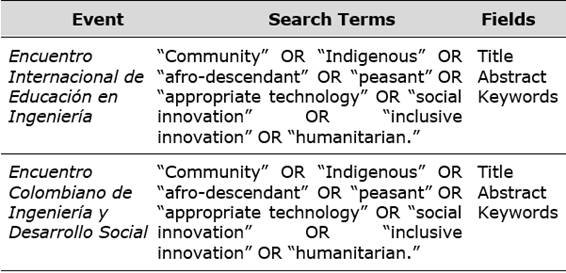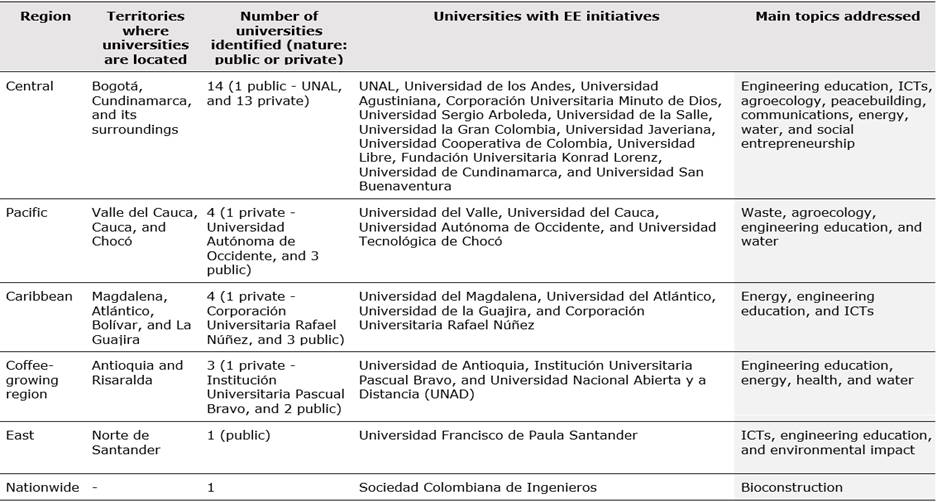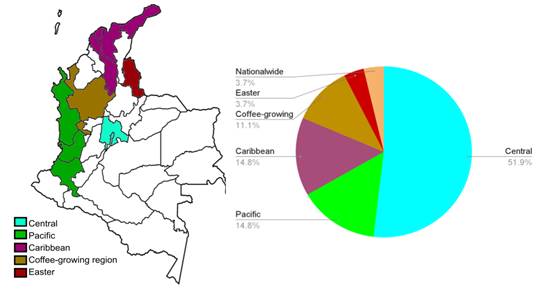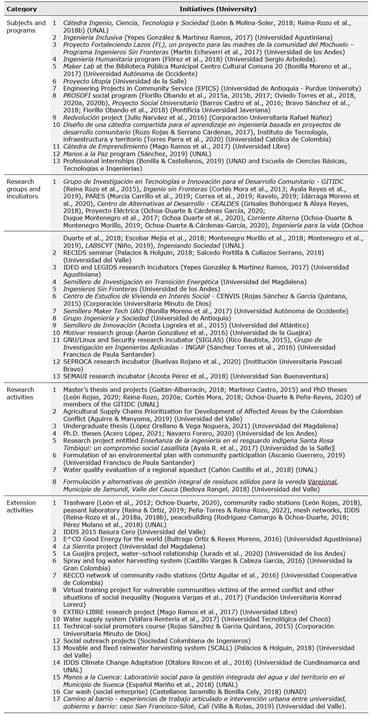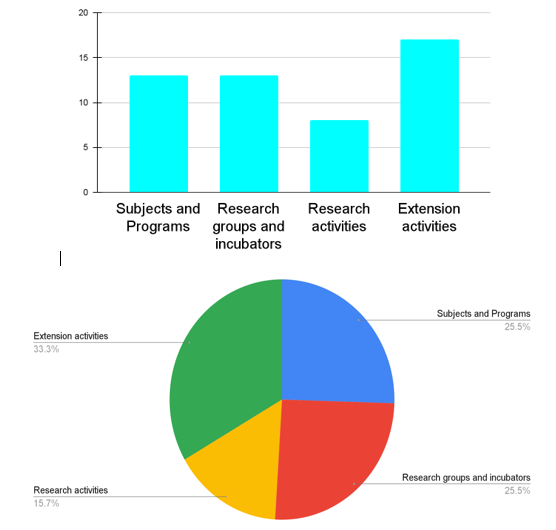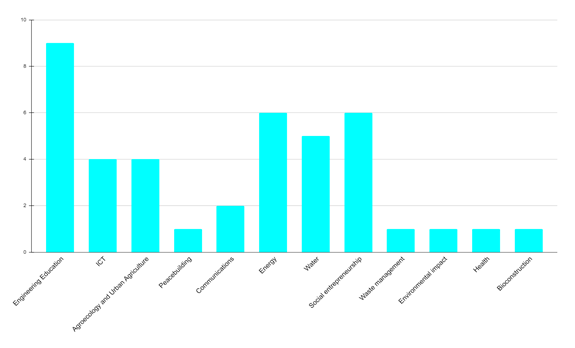INTRODUCTION
The development model imposed by the Global North has had a series of ecological, social, cultural, and economic implications worldwide. Particularly, its effects have been concentrated on excluded social sectors, mainly indigenous peoples, peasants, the African diaspora, and inhabitants of urban peripheries. As Leff (2004) argues, we are facing a civilizational crisis that has materialized in several ways, and the COVID-19 pandemic is an example of this. The way we relate to our natural environment and society, which is linked to an economistic and short-term vision, has shown its exhaustion. Consequently, engineering must reflect on its role and praxis within the existing socio-technical system.
Although proposals to overcome crises, such as the Sustainable Development Goals, emerge from the hegemonic discourse, they become euphemisms because they are based on the idea of perpetual growth in a world with finite resources (Furtado, 1974), without questioning the foundations of Western society, among which are modernity, capitalism, and anthropocentrism. In this regard, some authors such as Tortosa (2011) argue that what has been achieved is a bad development, whose main characteristics are heteronormality, patriarchy, and coloniality of power and knowledge. The latter materialized as a result of socioeconomic inequality and the deterioration of nature. Moreover, critiques of the notion of development have originated from different geographies, including the European movement known as degrowth (Latouche, 2006) and the Latin American proposal known as El Buen Vivir: Sumak Kawsay, una oportunidad para imaginar otros mundos (Acosta, 2013).
These movements supporting transition towards other possible worlds are based on the prevailing growing inequality, the destruction of the natural world, the increasing socio-ecological conflicts, and the surveillance of technological systems, among many other factors. Thus, engineering as a discipline has been part of these processes, which have had clear social and ecological impacts. In this case, the historical relationship between engineering and war is much closer than is usually recognized (Nieusma & Blue, 2012). Because of this, some authors advocate social justice as a basis for an alternative engineering praxis (Nieusma & Riley, 2010; Riley, 2008) and to create engineering outreach initiatives based on Buen Vivir (Ochoa-Duarte et al., 2021).
In November 2016, the Final Agreement to End the Armed Conflict and Build a Stable and Lasting Peace was signed between the Colombian government and the Fuerzas Armadas Revolucionarias de Colombia - Ejército del Pueblo (FARC-EP) guerrilla group. In this context, several perspectives regarding the role of Science, Technology, and Innovation public policies in the post-agreement framework have emerged. A series of exclusion forms have been identified in these policies, which can be summarized as i) social, faced by social groups excluded from participation in technoscience processes; ii) territorial, oriented toward the predominance of some territories over others; and iii) sectoral, aimed at supporting some production activities over others (Ordóñez-Matamoros et al., 2017). In this regard, Rodríguez-Camargo and Ochoa-Duarte (2018) have reflected on the role of science and technology in strengthening processes for the creation of pedagogies for peacebuilding.
Engineering education and engineering as a field have rooted their practice in the “development” paradigm as a western ontology with its epistemic and methodological core principles (Robbins & Crow, 2007; Robbins et al., 2020). However, criticisms arise from the engineering-society relationship towards development, without taking into account the historical effects of this worldview (Kleba & Reina-Rozo, 2021; Escobar, 2014). As for organizations, Engineers Without Borders chapters have been created around the world since the 1990s, seeking to integrate engineering and society from different perspectives. This organization was inspired by Doctors Without Borders, whose main role has been to provide humanitarian assistance.
Other international organizations, such as Engineering for Change (E4C) in the United States, have incorporated, into their work, this perspective focused on satisfying the main demands of society, especially marginalized communities. E4C has mapped the state of Engineering for Global Development in diverse geographies, including Australia (Keogh, 2019), the United States and Canada (Peiffer, 2019), and Latin America (Rojas, 2020). The interest awakened by the praxis of engineering in conjunction with society has resulted in several reviews of engineering education programs that address these elements, particularly the work done by Smith et al. (2020). These authors have focused on understanding this institutional and pedagogical scaffolding in Australia. Therefore, this initial exercise is inspired by this type of review and seeks to feed an increasingly necessary discussion about the relevance of engineering education in our context.
This paper aims to review the universities’ practices (research, outreach, and education) that are embedded in the Engaged Engineering (EE) framework. Our scope will be limited to the proceedings from two engineering education events because we want to focus on preliminary practices and works in progress that are not covered in mainstream literature. The main limitation of this study is the lack of conceptual development of EE and its diversity of approaches. The main questions that drive this inquiry are: Which currents of EE have been identified? From the perspective of academic events, how many university initiatives on EE are there in Colombia? Where are they located? What type of activities are performed? Which are the predominant themes?
This article is divided into six sections. The second section presents the state of the art of the EE framework. The third section describes the methodological design based on a literature review of EE initiatives in Colombia. The fourth section presents the results of the review at both the institutional and case levels. The fifth section discusses the results obtained regarding the challenges identified in the review. Finally, the sixth section draws the conclusions and suggests future actions to strengthen this emerging engineering praxis.
ENGAGED ENGINEERING AS A VITAL AND PEDAGOGICAL PRAXIS
This section presents the state of the art of EE and its pedagogical and practical approaches, with an emphasis on Latin America. According to the academic literature, this is an emerging field of praxis in the relationship between engineering and society. In particular, the analysis conducted here is focused on the similarities and differences at the praxis level. Engineering has maintained a positivist and deterministic approach when facing the challenges of contemporary society. However, there are also processes of resistance against the hegemonic way of seeing the world (de Sousa Santos, 2009). Thus, different educational institutions and social organizations have developed reflections on the social meaning of engineering, which focus on alternative praxes framed in new ethics for teaching and practicing the profession.
This perspective of engineering within a social approach has been given several names in the academic literature in order to bring together the various approaches immersed in it, delimiting their common elements but also their theoretical, conceptual, methodological, and practical differences. In the Global North, it has been called humanitarian engineering (VanderSteen et al., 2010), humanitarian action and development engineering (Smith et al., 2020), socially engaged engineering (Litchfield & Javernick-Will, 2015), activist engineering (Karwat et al., 2014), and engineering for global development (Keogh, 2019), among many other names. Meanwhile, in the Abya Yala or Latin America, it has been called grassroots (popular) engineering (Fraga et al., 2020) and engaged engineering (Kleba, 2017). The latter is an umbrella concept that aims to create a diverse space of praxis.
In this paper, we will focus on EE because it considers a variety of approaches when it comes to the relationship between engineering and social transformation. It is defined as the new role of engineering for social change. EE presents itself “in plural initiatives within engineering schools, inclusive development actions, education guidelines, non-profit organizations, social business, and social technology networks, among others” (Kleba, 2017, p. 171). In line with the STS Engaged program, this macro-concept seeks to be diverse and integrate different approaches and a great variety of practices, methodologies, and conceptions towards the promotion of science and technology that benefit the widest populations (Sismondo, 2008). Another of its goals is to overcome the ethical foundations of traditional engineering and the relationship with nature and society over time (Catalano, 2006).
In this regard, there have been discussions, reflections, and considerations on how this approach can benefit engineering students and professionals through the exploration of other epistemologies (Lord et al., 2019). This diversifies practices and increases the possible ways to practice, research, learn, and take engineering from the university to the professional world. Also, the decolonization of engineering curricula has been accompanied by approaches such as social justice through processes of redistribution, recognition, and representation (Fraser, 2009). New research attempts to study colonial engineering projects, especially those from the United Kingdom (Eichhorn, 2020). As a result, engineering education has managed to improve student motivation by giving great relevance to the local context and inspiring future engineers to co-create innovative solutions to meet the needs of their communities (Winberg & Winberg, 2017).
Engineering praxis concerning the satisfaction of the needs of excluded and marginalized social sectors has gained greater interest since the last decade of the 20th century. To mention one of the practical sectors, there are references to the active role of engineering in disaster recovery (Cuny, 1983). Since that time, engineering professionals and researchers have focused their attention on the relationship between engineering and society, primarily from the perspective of engineering to help (Schneider et al., 2009). Thus, the short-term urgent needs of the population at risk have been prioritized. This approach is also considered “neutral” at the political level and from a humanitarian perspective.
However, in the face of medium- and long-term processes and, mediated by a political perspective on technology-society relationships, approaches linked to engineering in solidarity emerge (Ali, 2015). These are in favor of socio-technical processes from a critical perspective of education, in interdependence with the support for social and environmental movements, other forms of economy beyond capitalism, and alternatives to the hegemonic model of development, among many other struggles. We could call this “solidarity-based technoscience” based on the work of Dagnino (2019a, 2019b). Additionally, this perspective is nourished by the free culture and open science movement, which proposes to make the scientific and technological process, in each of its phases, accessible to marginalized populations, as well as to share data, publications, licenses, among other things (Reina-Rozo & Medina-Cardona, 2021).
Reina-Rozo (2020b) and Souza de Alvear and Azevedo Nunes (2019) created a typology of diverse engineering praxes in conjunction with society. From them, three currents of thought and action emerge: i) humanitarian and development Engineering, whose one of its major representatives is Engineering Without Borders; ii) engineering for peacebuilding and social justice, which focuses on processes of social justice and peace mediated by processes of action without harm; and iii) popular engineering, as a praxis based on popular education and social and solidarity economy. Figure 1 illustrates the EE movement, with its two “arms” and the three currents of praxis.
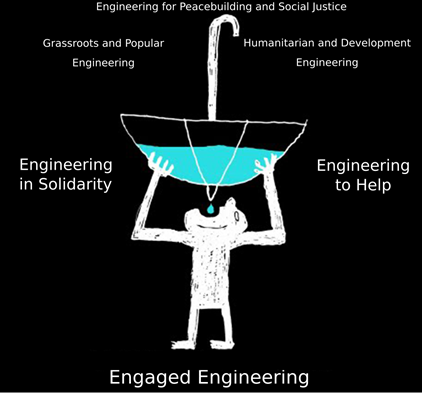
Source: Created by the authors based on the illustration entitled La tecnología debe cambiar by Alejandro Magallanes.
Figure 1. Graphical representation of the engaged engineering movement
Therefore, these practices, although ideologically, conceptually, and methodologically dissimilar, tend to transform the status quo. These socio-technical approaches range from a short-term intervention in disaster situations to more profound processes of vindication of rights or even transformation of the political and economic model in the long term. These currents vary from assistance to processes that transform the social, economic, and environmental reality. Thus, they should be thought of as nonlinear processes that can change over time according to temporal, ideological, economic, and collaborative work variables. The three main pedagogical and practical currents that were identified in the literature are described below in order to determine their action.
ENGAGED ENGINEERING’S PEDAGOGICAL AND PRACTICAL APPROACHES
Humanitarian and Development Engineering
In its broadest sense, humanitarian engineering is the convergence of engineering and humanitarianism. It has its roots in countries of the Global North that generate processes or activities in countries of the Global South. It has become a discipline that emphasizes the creation of human-centered solutions, particularly in interaction with vulnerable and marginalized communities. This area of professional development has a recent history, beginning with Non-Governmental Organizations (NGOs) through education efforts in universities to now being a focus of several social entrepreneurship initiatives (Muñoz & Mitcham, 2012; Muñoz, 2015).
It is an engineering practice that seeks to design and implement technical solutions to priority problems related to survival through co-creation and from a perspective whose center is the human being (Reina-Rozo & León Rojas, 2017). One of its major practitioners has been Engineers Without Borders, an international organization that operates in each country differently and independently. The first exercise was performed by Ingénieurs Sans Frontières in 1982, an organization created and inspired by the work of Médecins Sans Frontières.
However, there are criticisms regarding the interests of the parties involved, the effects of the solutions on the communities, and the possible welfarist nature of this approach (Reina-Rozo, 2020b). Despite this, there have been processes of internal reflection in this type of organizations regarding their work in interaction with the communities and the impact of their actions in the face of welfare dynamics (Valderrama Pineda et al., 2012). Finally, in the last decade, the concept of development has occupied a central place in their actions, which are linked to the United Nations 2030 Agenda for Sustainable Development.
Engineering for peacebuilding and socio-ecological justice
This engineering practice is based on the premise that peace cannot be defined from a single point of view because its relationship with different types of violence (direct, structural, cultural, or symbolic) and conflicts suggests that there are different types of peace. Hence, contemporary society and its complexity play an important role in the development of peace studies, an approach based on the dialogue between knowledge and disciplines that proposes alternatives for the creative and peaceful resolution of existing and future conflicts by limiting violence in its different forms.
Also, it is possible to develop a creative and dynamic approach to the concept of peace from various areas of knowledge, offering a wide variety of dynamic methodological paths for conflict resolution without resorting to violence and by creating a culture of peace that allows us to move forward in the construction of a much more just and egalitarian world (Jiménez Bautista, 2018). Adding to the above, there is Galtung’s work (as cited in Vesilind, 2010) on the concept of positive peace, which he defines as “more than the absence of violence; it is the presence of social justice through equal opportunity, a fair distribution of power and resources, equal protection and impartial enforcement of law” (p. 124).
The relationship between engineering and peace begins with a reflection on the deep collaboration that has existed between the military-war apparatus and the discipline of engineering, from military engineering to today’s large budgets of technoscience for “defense.” Vesilind (2010) unveils this relationship and proposes that pedagogy and practice should be oriented towards processes of peacebuilding and social and ecological justice. Building on that, Karareba and Baillie (2019) suggest a community-based approach to engineering practice, which goes through a situated construction of knowledge and know-how.
Engineering for peacebuilding is, therefore, an emerging praxis aimed at overcoming all forms of violence perpetrated by the state, private organizations, illegal groups, and other organizations through an economic, political, or social model based on the ethical and transformative application of technology management. As a result, this engineering practice cannot be separated from the environments where it is developed based on the knowledge, traditions, landscapes, spiritual values, and customary norms of local communities (Reina-Rozo, 2020b). Likewise, this approach feeds on the long-standing critique of development that has originated in several regions of the Global South, as well as in Latin America (Kleba & Reina-Rozo, 2021).
This approach has been formalized since 2018 through various initiatives, starting with the suggestion of Engineering for Peace as a space for discussion within the World Engineering Education Forum (Jordan et al., 2018). Following this, several universities, research centers, and international organizations have joined their efforts around the Engineering for Peace Consortium founded in 2019 (Jordan et al., 2020). Likewise, in the academic literature, this approach is gaining momentum, with the publication of studies, experiences, meetings, and compilations of research results (Phillips, 2020a, 2020b).
Grassroots and Popular Engineering
It is an approach developed mainly in Brazil and shared through the Encontro Nacional de Engenharia e Desenvolvimento Social (ENEDS) (Addor et al., 2015), which is inspired by Marxism and Paulo Freire’s popular education model (Fraga et al., 2020). It is transversally linked to the concepts of social technology, solidarity economy, and university extension (Cruz, 2017). Thus, it encourages its practitioners to work as mediators in participatory processes in which technological solutions to social problems are designed based on the role of the educator engineer (Souza de Alvear et al., 2017; Cruz, 2019). This proposal criticizes the global economic model, which conceives technological development as a political scenario, arguing that the system will not create solutions to the problems that it generates (Cruz, 2018).
Following Cruz (2018), the radical transformation of reality is achieved through the empowered and dialogic construction of the socio-technical order based on the demands of the popular sectors. Hence, popular engineering should focus its efforts on two key elements: a) ensuring means to deeply listen to grassroots groups, and b) devising and implementing strategies to improve the popular styles that are developed (p. 15). This pedagogical and practical approach takes as its basis the concept of engineering for social development, which emerged in Brazil in 2003, hand in hand with federal public policies, to become a process of construction of socio-technical alternatives with the popular classes (Fraga et al., 2020).
In Brazil, through the ENEDS, the Rede de Engenharia Popular Oswaldo Sevá was created in 2014. It is based on the values of popular education, social and environmental justice, self-management, feminism, anti-racism, care for life, diversity, appreciation of culture, and recognition and dialogue of different types of knowledge (popular, traditional, academic) from various disciplines (Cruz, 2019). These advances have inspired the emergence of a similar current in Colombia through the Encuentro Colombiano de Ingeniería y Desarrollo Social, which seeks to work under this approach (Salcedo et al., 2021). Finally, there are few studies in Colombia that attempt to understand and analyze these pedagogical and practical approaches. Apart from the reports of some NGOs in the Global North, the literature on EE and research efforts with an integrative focus at the international level are incipient. However, the work of Kleba and Cruz (2020), who compared educational initiatives in Brazil and Australia, stands out as a theoretical and methodological basis for this research.
METHODOLOGY
The number of studies into the relationship between engineering and marginalized groups is increasing, particularly in Abya Yala/Latin America (Kleba & Reina-Rozo, 2021). This article aims to continue the discussion of EE as a pedagogical and professional framework by developing a conceptual review and analyzing experiences in two academic events in Colombia. A literature review is conducted based on the contributions of two engineering education events in Colombia: the Encuentro Internacional de Educación en Ingeniería (EIEI) and the Encuentro Colombiano de Ingeniería y Desarrollo Social (ECIDS). The data used for such purpose are the proceedings of the EIEI and the ECIDS.
The time scope of the analysis goes from 2015 to 2020 for the EIEI and from 2018 to 2019 for the ECIDS, and the two primary objectives are: i) to identify the main areas of articulation and networking, and ii) to understand the dynamics, evolution, and characteristics of the field of EE based on the analysis of local experiences related to the five questions presented in the introduction.
The strategy for compiling the body of literature was based on the search, in the events’ proceedings, for a series of terms (originally in Spanish): community, indigenous, Afro-descendant, peasant, appropriate technology, humanitarian, social innovation, and inclusive innovation. Table 1 shows the matrix of keywords.
Such terms were chosen for three main reasons: i) the populations with whom this type of initiative is associated, ii) the typology of innovation or technology that is mainly framed within this engineering, and iii) other categories of engineering within the EE framework. Therefore, the body of literature in this systematic review was obtained by applying the following steps:
Selection of documents based on the results of the search in the proceedings.
Identification and removal of duplicates.
Application of inclusion/exclusion criteria. The documents identified as duplicates are analyzed, and those that do not meet all the inclusion criteria are excluded.
Verification of included items. In this last step, the body of literature is checked to ensure that it is relevant to the context of EE.
The inclusion and exclusion criteria were as follows:
The term must appear in the title or abstract of the contribution.
Contributions to congresses are accepted.
The document must be written in English or Spanish.
The body of the text should be longer than one page.
There must be access to the full text of the document.
The search strategy mentioned above retrieved 52 documents: 31 for the EIEI and 21 for the ECIDS.
INITIATIVES FROM AN ALTERNATIVE ENGINEERING PRAXIS
Levels of institutional articulation
The first exercises of EE pedagogy and practice in Colombia can be traced back to when Gerardo Molina was rector at Universidad Nacional de Colombia (1944-1948). During this time, the social practice of engineering was established, as students were required to complete their internship in government health campaigns and public works as a degree requirement, which legitimized the practice of engineering in society (León Rojas, 2020).
Ingenieros Sin Fronteras - Colombia
This initiative, inspired by Doctors Without Borders and with an autonomous and independent way of acting, carries out humanitarian interventions in various territories based on the questioning of national sovereignty and patriotism. Under these principles, a large number of groups have emerged, most of which are linked to engineering schools, where practice activities and projects are performed with marginalized communities in the Global North-Global South relationship (Reina-Rozo, 2020b).
In Colombia, a chapter was created in 2008 and called Ingenieros Sin Fronteras, which has produced contrasting results due to the diversity of practices and reflections (Cortés Mora et al., 2013; Valderrama Pineda et al., 2012). As of 2020, this initiative is composed of professors, researchers, and students from Universidad de los Andes and Corporación Universitaria Minuto de Dios in Bogotá.
Red Colombiana de Ingeniería y Desarrollo Social
The Red Colombiana de Ingeniería y Desarrollo Social (ReCIDS) was born in 2016 as part of the course Ingenuity, Science, Technology, and Society offered by the Universidad Nacional de Colombia (UNAL). Professors and students of engineering programs from different universities (such as the Universidad del Valle, the Universidad de Antioquia, the Universidad de los Andes, and the UNAL) meet in ReCIDS to articulate their actions. This network takes inspiration from and participates in the ENEDS held in Brazil. The ReCIDS also aims to be a space for interaction with the Rede de Engenharia Popular Oswaldo Sevá.
The peace agreement between the Colombian government and the FARC signed in 2016 led the ReCIDS to discuss the implications of their work in the post-agreement period (Gaitán-Albarracín et al., 2019b). Against this backdrop, a series of regional meetings were held in Bogotá, Medellín, and Cali to nurture the network with local discussions and experiences in the territories. As the regional meetings are held with the aim of linking spaces at the national level, the first Encuentro Colombiano de Ingeniería y Desarrollo Social (ECIDS) was planned and organized in the capital of the country, Bogotá (Gutiérrez et al., 2018). One year later, the second ECIDS was held in Cali (Gaitán Albarracín et al., 2019a).
In parallel with the work of the ReCIDS, several of its members are part of other international networks, such as the International Development Innovation Network (IDIN), and the Engineering, Social Justice, and Peace (ESJP) network. In turn, many members of the ESJP are part of the editorial committee of the International Journal of Engineering, Social Justice, and Peace, which constitutes an editorial space for scientific and technological dissemination. Some authors such as Salcedo et al. (2021) and Souza de Alvear and Azevedo Nunes (2019) have begun to intertwine the work of the ReCIDS with that of other networks in Abya Yala/Latin America.
The ReCIDS, in general, understands collaborative work as a non-curricular activity; thus, it is difficult to combine this endeavor with other academic or work responsibilities. Institutional support for the ReCIDS is also limited; therefore, the continuity of its processes depends mainly on the interests of those who lead them. Additionally, different regional studies are framed within the principles of the network, but their authors generally only interact in national meetings, hence the need to find strategies for collaborative work between nodes to strengthen partnership in this network (Rincón Bucheli et al., 2021).
Formal organizations
The Asociación Colombiana de Facultades de Ingeniería (ACOFI) is an organization that articulates all the faculties of engineering in the country. Its mission is to promote and improve the quality of teaching, research, innovation, technological development, and extension activities in engineering programs in Colombia. Within its scope of action, the ACOFI annually organizes the EIEI, which is a key meeting for researchers investigating the role of education in today's socio-technical systems. In the last decade, on several occasions, the topic of the EIEI has explicitly revolved around the relationship between engineering and society. For instance, in 2017, the topic was The engineering schools and their engagement to society; and, in 2020, it was Engineering education: A commitment to development and sustainability.
The Sociedad Colombiana de Ingenieros (SCI) is an advisory center of the Colombian Government for academic, scientific, and trade-related matters. Its main mission is to improve the quality of life and wellbeing of humanity through the advancement of science and engineering. Therefore, the SCI’s Young Engineers Committee has participated and generated actions around EE education in Colombia.
EXPERIENCES OF ALTERNATIVE PRAXIS OF ENGINEERING IN COLOMBIA
The EE experiences presented below were collected through a review of the papers of participants in the ECIDS and the EIEI, organized by the ACOFI, whose titles and abstracts refer to "engaged engineering." Table 2 shows the number of such papers classified by year of publication.
Table 2 Number of papers on EE at the ECIDS and the EIEI from 2015 to 2020

Source: Created by the authors.
In total, there have been 52 papers from universities nationwide, which means an average of 5 publications per year in the case of the EIEI and 10 in the case of the ECIDS. Table 3 presents the initiatives by region.
This concentration of initiatives in the central region may be due to the displacement caused by the Colombian internal conflict, as well as the large number of institutions in this territory, which is derived from population density dynamics. However, as shown in Figure 2, the other regions present very similar distributions, which evidences that EE is present in different Colombian territories and seeks to respond to the needs of the communities that are close to the institutions.
These EE proposals can also be classified into four categories, as shown in Table 4: (1) subjects and programs, (2) research groups and incubators, (3) research activities, and (4) extension activities.
The table above shows that EE initiatives are very diverse, and, in some cases, they pursue the goals in the mission statements of the universities where they are developed. Figure 3 allows us to better understand the distribution of EE initiatives by type of activity.
Finally, the EE initiatives in the tables above can be categorized into 12 main topics: engineering education, ICTs, agroecology and urban agriculture, peacebuilding, communications, waste management, energy, water, social entrepreneurship, health, environmental impact, and bioconstruction. Table 5 details the topics of EE investigated in Colombia, the institutions that have addressed them, and the region where they are located.
Table 5 Topics of EE initiatives in Colombia and institutions that have implemented them
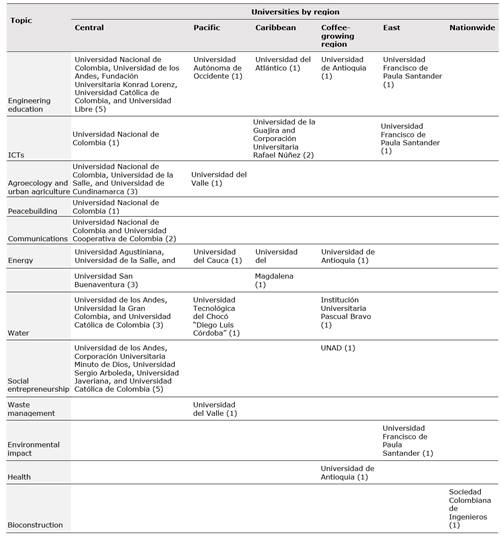
Source: Created by the authors.
The table above demonstrates the diversity of approaches and topics in the EE initiatives reviewed in this article. Also, the main topics for EE activities are shown in Figure 4.
DISCUSSION
To start this discussion, we want to recall our research questions: What currents of EE are identified in the literature? How many university initiatives of EE are there in Colombia from the point of view of academic events? Where are they located? What type of activities do they carry out? What topics are predominant?
First, following Schneider et al. (2009), we want to discuss the role of engineers in social transformation(s), which presents a dilemma:
By imagining themselves as solvers of developing-world problems, they may unknowingly entwine themselves in the long histories of colonialism, imperialism, and neoliberalism, as has been argued by many engaged in development studies and feminist critical theory (p. 45).
Therefore, we want to problematize the role of engineering professionals or students beyond the construction of a solutionist approach. According to the review above, there is a plurality of practices in the field of EE, ranging from social entrepreneurship to popular engineering.
The map of EE initiatives classified by region (Figure 2) presents an unusual grouping to analyze Colombian EE practices. This is intentional because, if we used the official division into five natural regions (i.e., Andean, Pacific, Caribbean, Orinoco, and Amazon), there would be a greater concentration of initiatives in the Andean region. As a result, it would be difficult to highlight possible differences between institutions located in neighboring departments, such as: (a) Bogotá and Cundinamarca as the core of the central region; (b) Antioquia and other coffee-growing areas; (c) Valle del Cauca and the Pacific region; (d) several cities on the Caribbean Coast, articulating the Caribbean region; and (e) the Santanderes in the eastern region. In this way, it was possible to present a greater diversity of approaches, institutions, and characteristics in each region.
The EE proposals reviewed in this study present different levels of institutionalization. Some of them are carried out informally, while others are part of student projects or activities of research groups and incubators that can be reported in final projects and theses, which are generally not funded. Some other initiatives are implemented by work teams in outreach programs of institutions with communities. Additionally, said proposals present different levels of systematization of the experiences. While some initiatives have multiple publications (such as the PROSOFI program by Universidad Javeriana, the GITIDC research group, and the ReCIDS network), others have been poorly documented according to this literature review.
It is also possible to argue that several of these initiatives have been mostly proposed by a particular student or faculty. Therefore, although they receive a certain degree of institutional support, they are not always an integral part of the institutional programs or the policies of their engineering schools. The categories used above to classify the EE initiatives in Colombia were defined according to the mission statement of universities, which comprises instruction (which includes courses and programs), research (which includes research groups and research workshops, as well as other types of research activities) and outreach (which includes university extension activities and relations with communities). However, the limits between the categories in this classification are blurry since some initiatives work for the interactive integration of different objectives in the mission statement of universities (Reina-Rozo & Diaz Avendaño, 2015).
Another interesting fact is the distribution of topics among Colombian regions. On the one hand, engineering education has been addressed in all the regions, which shows that different ways of educating in this field of knowledge should be explored, and EE can be a relevant factor for this transformation. On the other hand, the central region, the one with the largest number of institutions, presents the greatest diversity of topics and approaches. Additionally, some regions have implemented approaches that have not been adopted in others, which may be due to their conditions (curricula, interests of those who design the proposal, and regional approach, among others). Such is the case of waste management, environmental impact, and health, which have been investigated in the Pacific, Eastern, and coffee-growing regions, respectively. It is noteworthy that the Caribbean region has not addressed the topic of water, but there may be initiatives that were not found in this review.
Regarding the type of universities that have implemented EE initiatives, most of them are private (16) and some are public (10). However, many initiatives have been proposed and carried out by the latter type, which is evidenced by the fact that some public institutions have more initiatives in some categories, e.g., UNAL and Universidad del Valle. This may be due to their level of involvement with their surrounding communities, as well as a social purpose of students and professors leading the proposals. Nevertheless, this does not discredit the existence of EE initiatives emerging from and developed by private universities. In this regard, the central region shows more private institutions with EE initiatives, while, in the other regions, it is mostly public universities that undertake these projects.
EE presents a great diversity of possible approaches and topics, which are reflected in the initiatives reviewed here. EE has proposed and promoted other ways of living the profession through institutions, groups, and individuals. This kind of engineering can be used to construct alternatives against the dominant logic, thus being much more oriented to and focused on communities. It seeks a Buen Vivir, a synthetic concept involving indigenist, socialist, and environmentalist currents (Hidalgo-Capitán & Cubillo-Guevara, 2017). Furthermore, the relationship of EE with nature, social interdependence, and personal satisfaction (Hidalgo-Capitán et al., 2019) can guide the practice of future engineering in Abya Yala/Latin America.
EE, as an umbrella concept, includes initiatives related to "humanitarian engineering," "popular engineering," and "engineering for peace." However, this paper intended to discuss them all through the lens of EE. It was found that some articulation networks present particularities, e.g., their approach, topics, or type of organization. Despite their differences, their common goal is to transform, in one way or another, how engineering is done, taught, and lived. Although this review focuses on academic events, we recognize the need to diversify this research and involve other types of scenarios in which EE proposals are disseminated. They include informal student and faculty spaces, as well as meetings of organizations and social movements in which educational issues are discussed and engineering can appear as a topic to be addressed. They were not considered in this review for reasons of scope and time; nevertheless, they may constitute a source of additional data for future work.
Although there are several EE initiatives in Colombia where it is possible to exchange experiences, they are barely emerging due to their counter-hegemonic character (expressed in a positivist ethos and profit drive). Moreover, they are born from the will of individuals and collectives, which generally begins as projects, and little by little they incorporate new tools and strategies, e.g., institutionalization through the creation of research groups and incubators, promotion of programs and courses, and formulation and implementation of research and extension projects. This is not a linear process with stages for the consolidation of EE. On the contrary, all these approaches coexist and nurture the construction of alternatives that aim to make another possible world a reality using engineering.
In Colombia, there is a wide array of EE initiatives with regional and local impact. This review highlighted the territories where EE activities are carried out, which cover the five regions of the country. However, territories such as the south and southeast of Colombia do not have EE initiatives according to this review. Additionally, most of the initiatives are related to instruction (subjects and programs), research, and extension, mediated by research groups and incubators. Regarding their topics, the initiatives revolve around engineering education, social entrepreneurship, energy, ICTs, communications, and water, among others, which shows their great interest in the articulation between university instruction and extension.
In terms of limitations, it can be argued that, although there may be EE proposals in other territories or institutions, they were not part of any of the two academic events selected for this review (i.e., EIEI and ECIDS). Therefore, other sources should be used to obtain information to update this initial mapping, which could provide new data and details that would favor the construction of a more comprehensive picture of the subject. However, this study is only the first step in the process of mapping EE initiatives in Colombia.
CONCLUSIONS AND FUTURE RESEARCH
This literature review investigated the proceedings of the Encuentro Colombiano de Ingeniería y Desarrollo Social (ECIDS) in 2018 and 2019 and papers whose titles refer to EE presented at the Encuentro Internacional de Educación en Ingeniería (EIEI) organized by the ACOFI from 2015 to 2020. This is not an exhaustive literature review, and it does not pretend to provide a global panorama of alternative engineering in Colombia. However, it constitutes the first analysis of different EE experiences in Colombia, which can be taken as a starting point for further research.
In this preliminary exercise, 52 EE-related publications were found in two academic events (i.e., EIEI and ECIDS). Their authors are affiliated to 26 universities located in 5 regions in Colombia, and there is one nationwide initiative. In terms of categories, outreach activities were found to be the most common, followed by research groups and incubators, and cross-curricular subjects and programs. The most common topics (or areas of action) of the initiatives described in the publications are engineering education, social entrepreneurship, energy, and ICTs.
Nevertheless, it is necessary to further investigate EE initiatives throughout Colombia. For that purpose, a questionnaire can be administered to the people and groups identified in this review to learn about the motivations behind their activities, the context in which they apply their vision of engineering, the way in which they relate to communities, and the territories where they carry out their proposals. These and other useful data and information will allow us to map useful initiatives for constructing solidarity networks and strengthen EE initiatives all over the country. In other words, by establishing communication these with authors and networks, we could obtain more data and information to learn about and better understand their experiences and thus enrich this field of research.
In terms of challenges and opportunities, these initiatives should continue over time as institutional programs and not as specific exercises that tend to disappear. Another important challenge is institutional articulation. This is because there are very few experiences of inter-institutional initiatives (only 3 were found in this review based on author affiliation) that show a dynamic of collective work between universities and research groups, both in the city where universities are located and the territories where the initiatives are implemented.
Regarding opportunities, the Colombian context is a good scenario to develop the field of EE considering the number of papers published in this area in the last six years. Finally, the implementation of the peace agreement should be a preponderant subject for the practice of EE in Colombia, especially in the framework of peace engineering.














